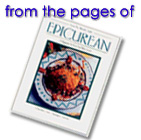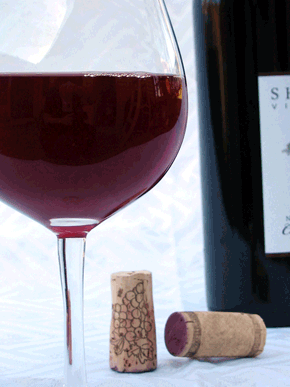
 |
|||||
|
|
|
|
|
|
|
When Should I Open This Bottle?The Art and Science of Estimationby Hank Rubin |
|
 Of all the questions submitted to me as a wine writer, the one that occurs most often and frequently baffling is, "When should I drink my wine?" A couple decades ago, when buying and cellaring was quite different, my routine answer would be to buy a case and open a bottle every six months, watch the development as it matured, and when it reached perfection enjoy the rest of the bottles. I tried this "open a bottle every six months" routine a few times, but my readers wouldn't accept that answer for today most readers don't buy wines by the case anymore, rather by the bottle, maybe two, and they want to get the most out of their purchase. Of all the questions submitted to me as a wine writer, the one that occurs most often and frequently baffling is, "When should I drink my wine?" A couple decades ago, when buying and cellaring was quite different, my routine answer would be to buy a case and open a bottle every six months, watch the development as it matured, and when it reached perfection enjoy the rest of the bottles. I tried this "open a bottle every six months" routine a few times, but my readers wouldn't accept that answer for today most readers don't buy wines by the case anymore, rather by the bottle, maybe two, and they want to get the most out of their purchase.
Alas! Those of us who prognosticate can only approximate. In the first place the conditions of storage and handling vary so much that identical bottlings can peak years apart. And all of the varying characteristics are modified depending on the ripeness of the grapes, the winemaking, storage etc. A Chateau Latour, for instance, from a big vintage such as 1945 or 1961, that was put into the cellar of a Scottish castle with a constant temperature of under 50° F might not reach its best drinkability for fifty years, while the same wine stored in a Manhattan apartment closet where the temperature ranges from about 65° to 85° F plus, could easily plateau in less than ten years. Nevertheless, on the island of Malta where cellar temperatures are constantly in the 80s, some wines keep well for several decades. Or how the wine has been handled could change everything. Despite a lot of folklore, wine is a pretty sturdy thing when it is young. But when it ages it sometimes becomes fairly fragile. In November of 1967 the Viscount Boyne offered for sale at the Christie's auction in London twenty four magnums of 1874 Lafite from his Scottish cellars. Very old wines such as those 93 year old beauties are usually opened only a short time before drinking because they are often so fragile that they deteriorate quickly upon being exposed to air. Michael Broadbent, head of Christie's wine department, from his long experience specifically with the wines of Lafite, decided to open the sample bottle forty five minutes prior to tasting. Thus from decanting to tasting, only three quarters of an hour. Lord Boyne, knowing first hand about his wine since he had tasted bottles periodically since his youth, strongly disagreed and sacrificed another magnum which he ordered opened eighteen hours ahead of tasting. It is virtually unheard of to give such a long breathing time for such an old wine. To the surprise of all the tasters his bottle was far better. These bottles had been moved only once when they were very young and then had been carefully transported to London for the auction. Lord Boyne was the expert for his bottles. At that auction I purchased a magnum of the 1874 for one of my restaurants. When a customer ordered it for a planned dinner the burden of decision then rested upon me. The pressure was great for I had priced it at $250 (in 1971 money-probably add another zero for the price today) and poor judgment by me would mean spoiled wine with my personal reputation and pride at stake. If the wine peaked before the customers arrived or if it took hours longer than expected to reach its peak until well past dinner time, there would be no chance to try again. I decided to open it after the diners had been seated. My reasoning was that at its age it wouldn't have the stamina to resist the hard handling, that the wine might have changed its character because all the shaking in transit and variation in temperature on its journey from England. The decision was a good one, for the wine opened to its fullest in twelve minutes and at twenty three minutes it started to decline, losing both its color and its bouquet quite rapidly. So how a wine is handled and when it is moved is important. Since questions such as these came from readers all over the country, where the wine was held must be taken into consideration. So if a reader lives in Nebraska without air-conditioning then I assume that those wines will probably mature considerably faster than in a cellar in San Francisco where it is quite temperate. What is even more intangible is that there are many different concepts of what constitutes the best goal of aging. What value to place on the fruity character of the wine versus the complex, more winey quality that develops with bottle age. In other words how much emphasis does the taster place on mellowness as opposed to the bite and astringency of acid and tannin. My prejudice leans towards more the mature and mellow for red wines which means plenty of age. In fact, I treasure smoothness and absence of bite so highly that often I will even tolerate wines being a little over-the-hill. At the same time, as a wine journalist I know that this is a personal idiosyncrasy. Most people like their wines fresher and, in addition, don't want to take a chance of holding a bottle too long. Sometimes, therefore, I make one evaluation on aging for myself and a separate one based on my assessment of most of my readers' tastes.
|

And my degree of personal experience with the vintage and the pattern of the winery will influence my judgment greatly. Where I know the vineyards, where the grapes came from, what the winemaker is trying to accomplish, the equipment of the winery, etc., then it is possible for me to be more accurate. Even more, if I have tasted a wine then I will, of course, have a more grounded basis on which to make an estimate, and my accuracy for a winery that I have tasted over the years will be better than one which hasn't been in existence long enough to have developed a track record. This August I opened a bottle of 1948 Chateau Latour. Immediately the bouquet was magnificent but the flavor was quite tannic. Fifteen minutes after decanting the tannic phase disappeared and the wine was everything I wanted-complex, fruity, full-bodied, smooth- all of the positive adjectives I could think of, but contrary to expectations it stayed that way for more than a hour. Sometimes we get letters that are more about people than about wines. Twenty years ago I received this letter from a young woman: "This guy I met tells me he knows about wines. I have always admired this knowledge but know little about it myself. He told me to keep a bottle of 1976 Simi Zinfandel, Alexander Valley for a few years. Is he for real?" I didn't know whether 'this guy was for real,' but the wine was excellent. I spoke with the winemaker, Zelma Long at the time, and she confirmed my impression of it. It would actually be two different wines depending on when it was drunk. Then it was very drinkable, zesty and fruity. After a couple more years of aging the wine and its style would change and be less grapey, more complex and mellow. I happen to like it both ways depending upon my mood or what food it would be served with. For a roast perhaps the older, for a pizza or stew I'd prefer the younger. So the real answer is, you have to make up your own mind about when to open a bottle of wine, depending on your preferences. An example of a person with wry good humor plus an unusual question was: "I have been invited to a New Year's Eve party for December 2019 at, of all places, the pyramid at Giza. Each invitee has been asked to bring a bottle of champagne from 1999. My question is, will the wine hold its sparkle? And will I?" My answer was "The chances of sparkling wines lasting twenty years are not very good, but I would suggest that you choose the best you can and buy four or five bottles, as one may come through better than the others. Wrap them each in about an inch of newspaper as insulation, taping them tightly and letting them lay on their side, undisturbed in a good storage place (cool, dry, dark). They may retain their sparkle, but I would hazard the guess that anyone with such a sense of humor will probably retain her sparkle..." Most of all, the aging process is so little understood that the best that anyone can do is make a guesstimate, which will be more or less accurate, depending upon a host of factors, not the least of which is a bit of luck. For example, some wines that seem to show great promise of lasting forever seem to fall apart. Others, such as the 1928 Bordeaux, always seemed to need another year or so, even after decades in the bottle.
To do better than estimate is not really possible for the whole process of wine growing, making, aging and estimating is more of an art, and only partly a science. What you can expect from me, and other wine writers, is what we think is the range during which the wines should drink well and keep improving. Some of us will be more optimistic than others, but unfortunately there is no way that we can put data into a computer and have an absolutely accurate answer. Still, our experience and judgments aren't just off the wall and what we offer are guidelines that certainly have value.
|
|
Copyright © 2008 Epicurean.com & Fezziwig Publishing All rights reserved |